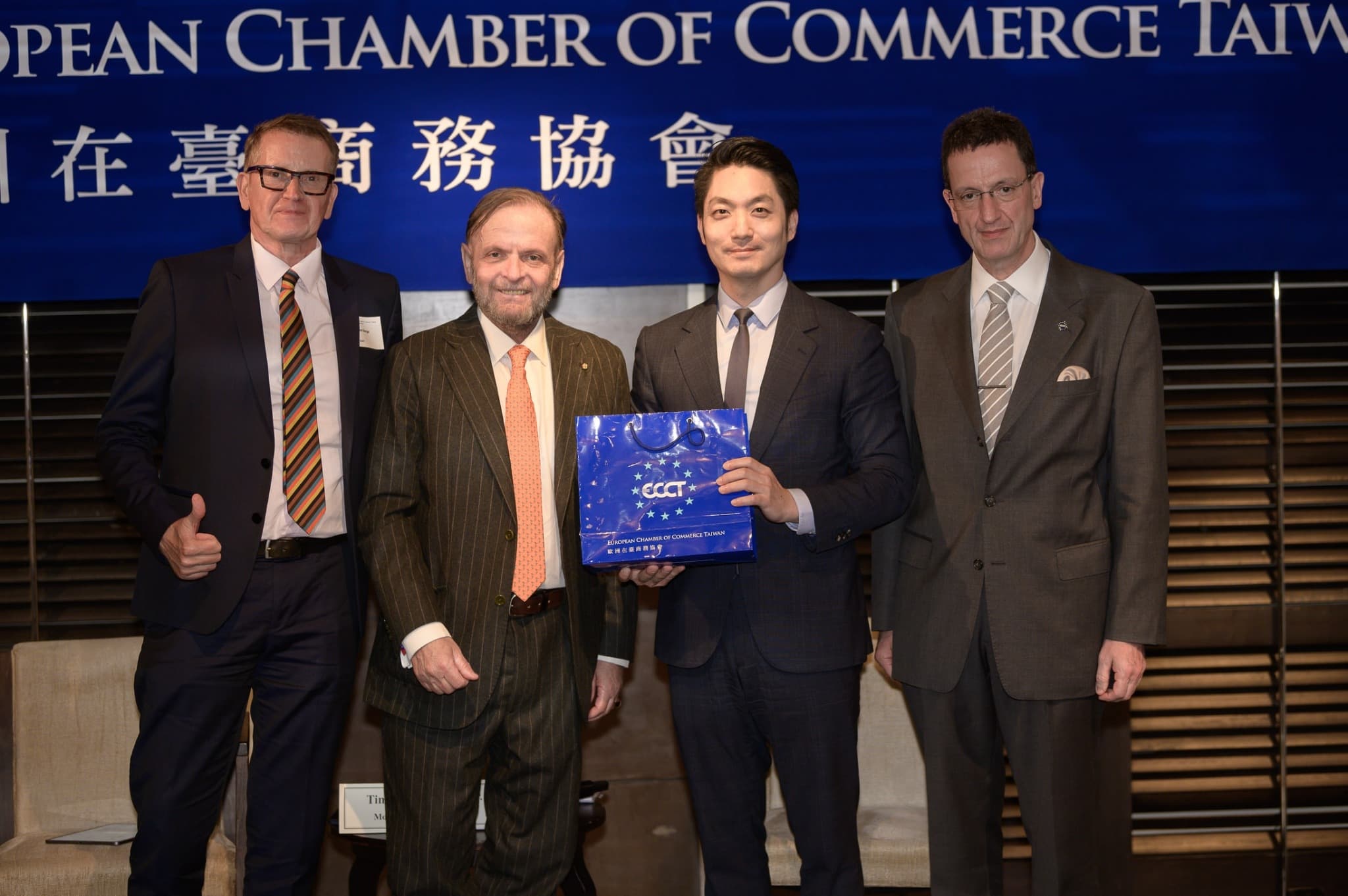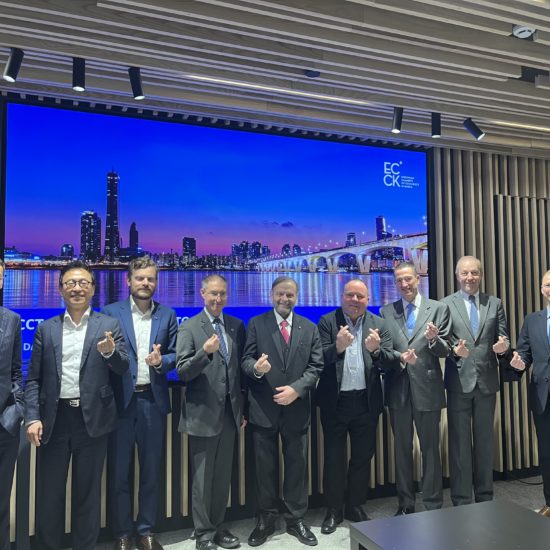Lunch with Taipei Mayor Chiang

The ECCT hosted its annual Premium Event lunch with Taipei Mayor Chiang Wan-an (蔣萬安) and senior officials from the Taipei City Government for the 26th consecutive year. In addition to the mayor, the event was attended by a delegation of 20 city government officials and over 100 ECCT members. At the event Mayor Chiang gave a speech after which Chen Chun-An, Commissioner of the Department of Economic Development (產業發展局 陳俊安局長) gave a presentation to update members on recent developments and plans for Taipei City. The event ended with a Q&A session with Mayor Chiang, moderated by Tim Berge, Co-chair of the ECCT's Better Living committee.
In his speech, Mayor Chiang said that he welcomed the opportunity to continue the annual tradition that goes back more than 20 years, since it provided the Taipei City Government with insights into European business investment, and dealings in Taipei, and the thoughts of ECCT members about the city and its administration. He noted that Taiwan is a major link in global trade value chains, especially in information and communications technology, artificial intelligence, smart transportation, wind power, and green energy, providing numerous opportunities for partnerships between Taiwanese and European businesses.
According to the mayor, the Taipei City Government is working to establish Taipei as an entrepreneur friendly city by promoting an entrepreneurial programme that provides access to startup incubators, accelerators, hubs, and financial systems. This programme is expected to draw more entrepreneurs and foreign investments to the city. In addition, the mayor hopes to promote the application of Artificial Intelligence with technologies such as the Internet of Things to improve the city's management efficiency. He said that he welcomed collaboration from the various industries in Europe to help create business opportunities. In response to suggestions from ECCT members, the mayor said that the city government officials would do their utmost to create a friendly, diverse and sustainable living conditions and investment environment. He concluded by announcing that Taipei City will be co-hosting the World Masters Games in 2025, which will feature 35 different sports. Anyone over the age of 30 may participate in the games, whether they are a professional athlete, or not. Everyone present at the event was invited to sign up and participate.
In his presentation, Chen Chun-An touted the benefits of Taipei as an investment destination and place to live and work. According to statistics cited by Chen, overseas investments in Taipei contribute to about 65% of the nationwide total with investments from Europe making up the largest contribution, at around 40%. In addition to an advanced industrial environment and communications infrastructure, commercial office space in Taipei enjoys a significant cost advantage compared to the rest of the Asia Pacific region (lower than most major cities), as well as good human resources and exhibition facilities. Taipei ranks highly in a number of areas. It is ranked as 9th globally in terms of digital competitiveness (by IMD), 5th best globally for expats (Internations), 4th best in terms of safety (Numbeo) and No. 1 Healthy City (Common Health Magazine).
In terms of future areas of focus, AI is expected to be a major growth driver and to enhance the city's administration. Smart healthcare and precision health is another area of focus, using big data and AI to provide more personalized medical programmes while encouraging the development of related industries. The city places a lot of emphasis on working towards achieving net zero emissions to address climate change and promote environmental sustainability. The ultimate goal is to become an environmentally friendly, sustainable city that attracts more eco-conscious companies.
In terms of supporting start-ups, Taipei currently has 13 startup bases operated by the city government. Each base provides innovative support to encourage founders to establish their business in Taipei in the future. The aim is to increase the number to 16 to support more entrepreneurs. The city is providing funding support, such as R&D subsidies to invest in emerging AI technologies. In addition, the city will continue to enhance customer services through public private linkups such as organising hackathons.
In the Q&A session, on a question about road safety, the mayor noted improvements in levelling roads and pavements and enforcing no parking regulations to remove scooters from illegally parking on pavements. In line with its net zero by 2050 target (which includes interim targets of cutting emissions by 40% by 2030 and by 60% by 2040), the city is offering various incentives to increase the use of public transport. This includes allowing residents to use Youbikes for free for the first 30 minutes and the introduction of a monthly unlimited public transport pass covering Taipei, New Taipei and Taoyuan.
In terms of family friendly policies, Mayor Chiang said that Taipei's birth rate had actually risen recently. The city is offering a number of incentives to help young parents, including subsidies to parents. Mayor Chiang also plans to address the shortage of child care facilities by establishing 15 additional childcare facilities in the city. According to the mayor, parents with two children younger than the age of 12 get priority access to social housing.
Mayor Chiang wants to go further than the existing bilingual nation policy to promote what he called a “trilingual” policy by adding coding education to existing efforts to make citizens fluent in Mandarin and English.
In addition to Mayor Chiang and Commissioner Chen, the following other Taipei City Government officials attended the lunch: Chen Yung-Te, Commissioner, Department of Civil Affairs (民政局 陳永德局長); Hu Hsiao-Lan, Commissioner, Department of Finance (財政局 胡曉嵐局長); Dr Tang Chih-Min, Commissioner, Department of Education (教育局 湯志民局長); Dr Chen Yen-Yuan, Commissioner, Department of Health (衛生局 陳彥元局長); Chao Shih-Lung, Commissioner, Department of Information Technology (資訊局 趙式隆局長); Dr Eric Yu (Chen-Hua), Chairperson of Research, Development, and Evaluation Commission (研究發展考核委員會 俞振華主任委員(兼國際事務委員會執行長); Yin Wei, Advisor to the Mayor and Spokesperson of Taipei City Government (市長室 殷瑋顧問(兼市府發言人); Chen Jung-Ming, Deputy Commissioner, Department of Transportation (交通局 陳榮明副局長); Chiang Ming-Chih, Deputy Commissioner, Department of Labor (勞動局 江明志副局長); Liao Tsai-Chen, Deputy Commissioner, Department of Police (警察局 廖材楨副局長); Lin Shu-O, Chief Secretary, Department of Social Welfare (社會局 林淑娥主任秘書); Lee Wen-Fang, Chief Engineer, Department of Public Works (工務局 李文芳總工程司); Yang Wei-Shiou, Chief Secretary, Department of Environmental Protection (環境保護局 楊維修主任秘書); Liu De-Jian, Chief Secretary, Department of Cultural Affairs (文化局 劉得堅主任秘書); Tsao Yen-Lun, Deputy Director, Taipei City Parks and Street Lights Office (公園路燈工程管理處 曹彥綸副處長); Jiang Chuen-Huey, Senior Specialist, Department of Information and Tourism (觀光傳播局 江春慧專門委員); Meng Hsu-Hua, Senior Specialist, Secretariat (秘書處 孟旭華專門委員) and Yen Liang-Chen, Specialist, International Affairs Division, Secretariat (秘書處國際事務組 顏良真專員).

